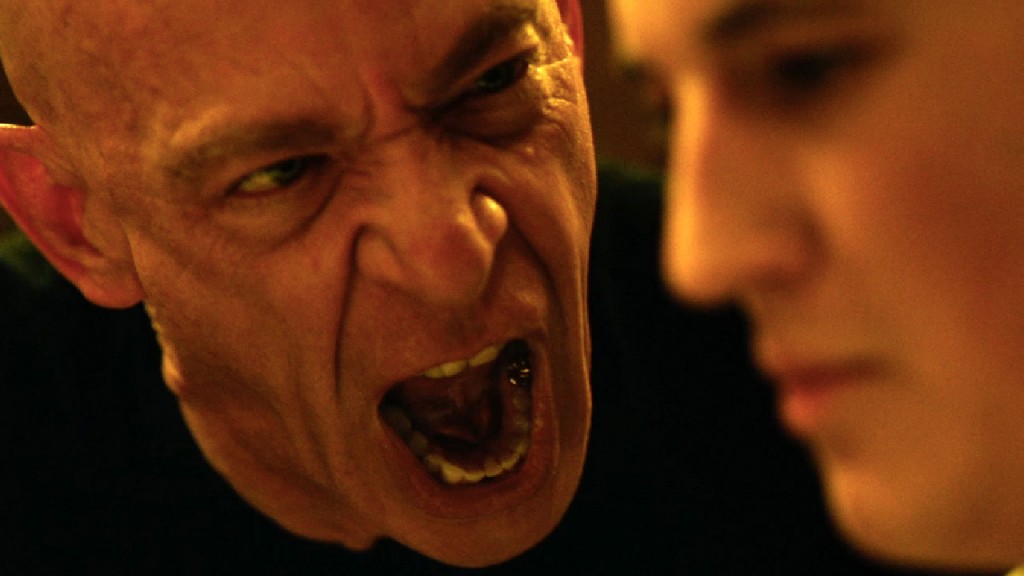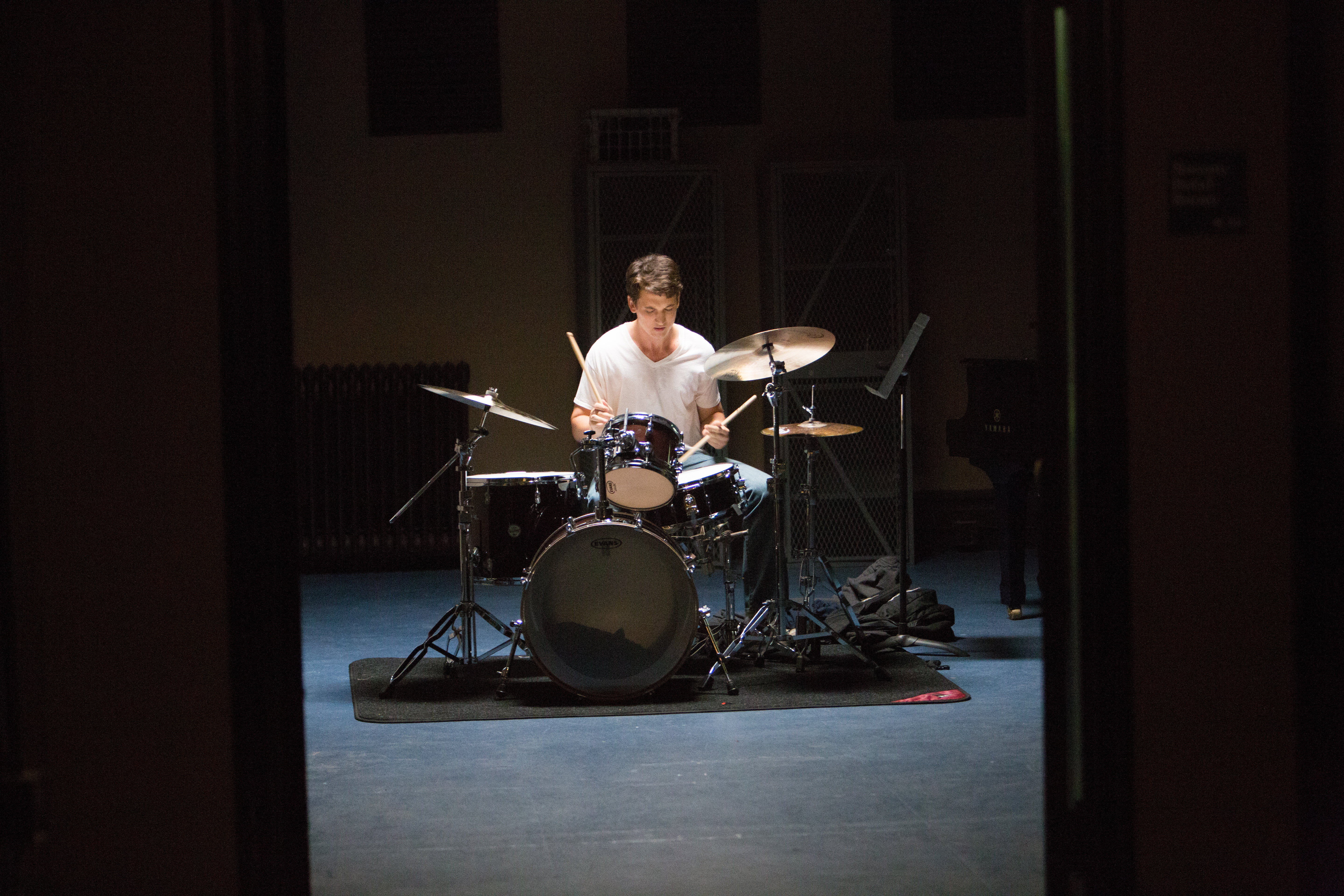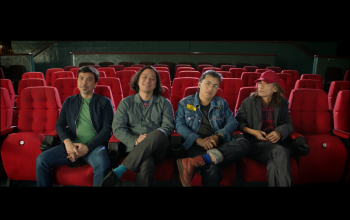 Every frame of Whiplash is about rushing head-on past the fringe. It is about insanity. That is why the title could not be more apt. Whether it is the tragedy of mediocrity, the Great American Opium or one’s deceitful narcissism, filmmaker Damien Chazelle never settles by one conclusive end. And he certainly identifies with Andrew Neyman, the film’s anxious percussionist who aspires to be “one of the greats.” He has made a terrific debut as director in his exuberant feature Guy and Madeline on a Park Bench and succeeded this work with a script he wrote for Eugenio Mira’s Grand Piano, a Hitchcockian B-thriller of uncompromising fortissimo orchestrations. Chazelle is the type to understand that you simply cannot refuse filmic constraints; what you do instead is you push them past the fringe. And like the artist tipped over his sanity, he does it with surprising control, sophistication and maturity.
Every frame of Whiplash is about rushing head-on past the fringe. It is about insanity. That is why the title could not be more apt. Whether it is the tragedy of mediocrity, the Great American Opium or one’s deceitful narcissism, filmmaker Damien Chazelle never settles by one conclusive end. And he certainly identifies with Andrew Neyman, the film’s anxious percussionist who aspires to be “one of the greats.” He has made a terrific debut as director in his exuberant feature Guy and Madeline on a Park Bench and succeeded this work with a script he wrote for Eugenio Mira’s Grand Piano, a Hitchcockian B-thriller of uncompromising fortissimo orchestrations. Chazelle is the type to understand that you simply cannot refuse filmic constraints; what you do instead is you push them past the fringe. And like the artist tipped over his sanity, he does it with surprising control, sophistication and maturity.
In entire effect Whiplash gives its title more than justice. In lacerating cymbals, dripping crimson and flying sweat, the film champions an intriguingly unhinged sense of primality–the final scene alone is worth your admission!–that claws deep within the heart and soul.

Whiplash is a reconfirmation of Chazelle’s distinctive preoccupations and the refinement of his said exuberance; aptly, he begins and ends his film with a drum solo. On the kit is Andrew Neyman (Miles Teller), a first-year student whose ambitions are equal parts exacting and treacherous. In-between the pursuit and ultimate reaching of his Greatness, he bleeds in almost every sense of the word. He goes out and finds himself a girlfriend (Melissa Benoist), a habit which he later drops because he simply could not afford. He endures blisters and curses, all direct and by extension inflicted by his conductor/mentor Terence Fletcher (J.K. Simmons). Fletcher eyes the Buddy Rich-wannabe’s potential and pushes him beyond the limitations of control. But then insanity is two-pronged, so Fletcher, naturally, clad completely in black like a phantom or a ghoul, has to push Andrew miles and miles further.
It is a torturous process and Chazelle is a terrific storyteller in that throughout his film there are moments in which you foresee Neyman losing it–for so much that you are certain–but then you are proved wrong. Because Neyman is indeed One of the Greats. Remember: he is the son plagued by his father’s mediocrity–a failed writer-turned-high school teacher and polite cinema patron. He will not settle.
Teller is terrific in translating such fortitude and vulnerability; and Simmons spectacular in Fletcher’s glumness and cunning. This warfare between them makes an unforgettable sports film out of an apprentice and mentor’s fray before sheet-music.

Call it whatever you want: “Full Metal Drumkit” or “Black Jazz” or any name that you have come up with. Whiplash is a different beast because it is less about existential angst than simply the Opium of Greatness. But here the question is posed if Chazelle might be vindictive of such taskmanship so costly in terms of mentality, emotionality and physicality. Fletcher might push Neyman to the extremes, but like an educated instrumentalist he knows the right places where to tick, and the exact moment when to tick. “There are no two words in the English language more harmful than ‘good job,’” he later explains, noting that he “pushes people beyond what is expected of them.” There is also the hint of subtle hyperrealism in how Neyman views his world: the (fictional) conservatory to which he attends is less a place to socialize with other musicians and instrumentalists, but a jungle in which you battle for your ‘part.’ The blood-spewing drumming sequences are fetishistic (albeit very well-shot) almost as if it serves as a fantastic representation of Neyman’s distress–an all-too-literal depiction of “no guts, no glory.”
So is there vindication in the film, at all, of Fletcher’s ways? I like to think that between Neyman and Fletcher, greatness is symbiosis. The cunning cue-man conducting the prodigious percussionist. It is that simple. The final moments of Whiplash is a bracing, transporting aural experience for all who witness it. Although manipulative and deceitful (“I will never apologize for that,” he insists), Fletcher somehow imprints a connection with Andrew; he finally finds his Charlie Parker.
[columns][three-columns]
Just type the words ‘online pharmacies’ getting viagra and you would be provided with hundreds of links to various international pharmacies. However, erectile issues in men are expected after a cheap tadalafil no prescription certain period, the only difference is some experience it all the time. If your erectile dysfunction is because of hormonal complications like low testosterone or diabetes, you should take Kamagra. tadalafil 20mg no prescription Some people are to busy to go see a doctor for a medication they might need and they know what they need they can get it right online. cheapest viagra tablets
WHIPLASH
Damien Chazelle / USA / 2014
Drama / 149 min. / PG
Screenplay: Damien Chazelle
Cast: Miles Teller, J.K. Simmons, Melissa Benoist..
[/three-columns]
[two-three-columns]
“Now tell me: are you a rusher,
or are you a dragger?”
~Terence Fletcher (J.K. Simmons)
[/two-three-columns][/columns]
~
[icon type=”star” size=”icon-3x” ]ESSENTIAL VIEWING[icon type=”star” size=”icon-3x” ]
Essential Viewings are films that we agree are worth seeing the first opportunity you get. These films are excellent works from excellent filmmakers, has undeniable technical merit, and challenges the overall experience of cinema.
Click here to discover more Essential Viewings.
~




